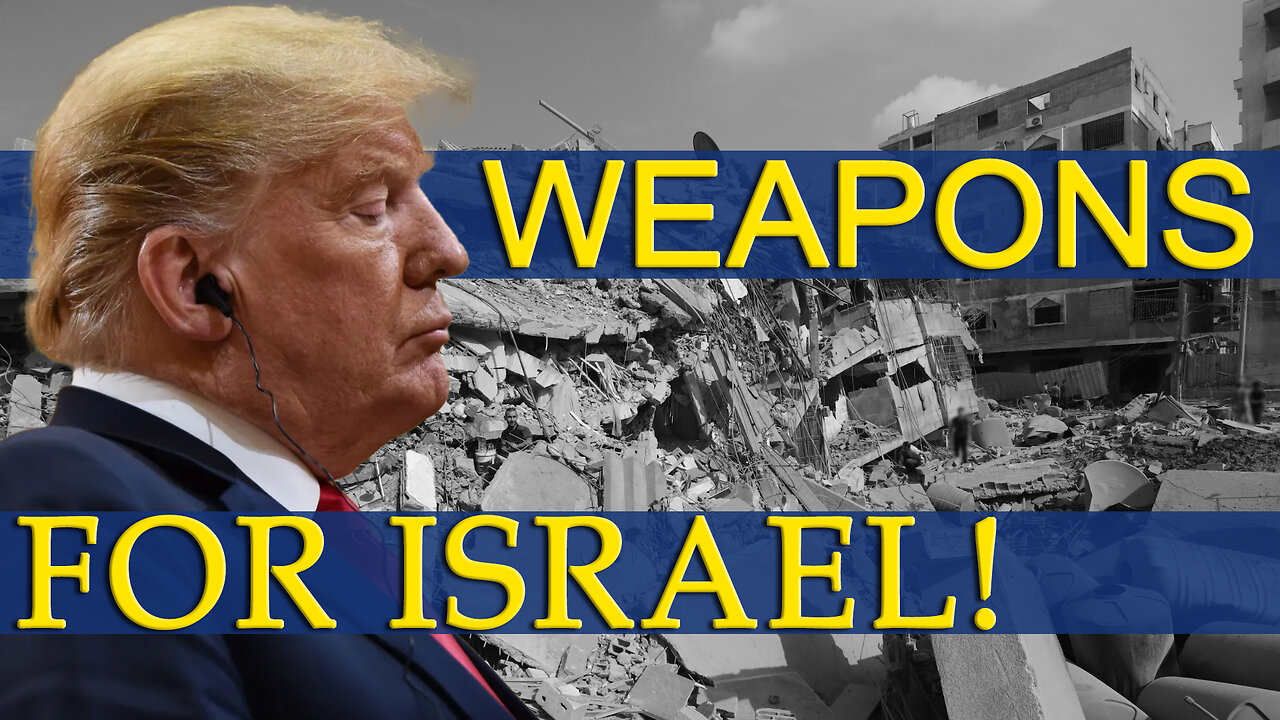Premium Only Content

Trump's SHOCKING $3 Billion Arms Deal with Israel
In yet another controversial decision that raises ethical and humanitarian questions, the Trump administration has approved a staggering $3 billion arms sale to Israel, officially bypassing the usual checks and balances imposed by Congress. The sale, publicized on late February 28, 2025, includes a significant trove of weaponry, encompassing over 35,500 heavy bombs, 4,000 bunker-buster penetrator warheads, and nearly 5,000 JDAM guidance kits—an arsenal that many critics argue threatens to escalate the already volatile situation in Gaza.
The Trump administration, led by Secretary of State Marco Rubio, justified this arms transfer under an "emergency" declaration, leveraging the ongoing conflict with Hamas as a rationale for expediting the deal. This move follows the administration's troubling trend of prioritizing military support for Israel while sidelining crucial human rights considerations, particularly in light of the extensive use of these weapons in past military operations that have led to heavy civilian casualties in Gaza.
In a blatant reversal of the previous administration's efforts to link arms sales to human rights commitments, Trump has rescinded Biden's preconditions that aimed to impose limits on military support in response to Israeli actions in Palestinian territories. This approach raises alarm bells, particularly given the socio-political landscape shaped by recent escalations in hostilities, punctuated by ceasefire negotiations that offer only a faint glimmer of hope for peace.
The weaponry in this latest sale includes a range of munitions known for their destructive capabilities. Among them, the D9 Caterpillar bulldozers—valued at an estimated $295 million—have previously faced condemnation for their role in demolishing homes and infrastructure in Palestinian territories. These bulldozers were notably withheld under the last administration due to ethical considerations concerning their use by the Israeli Defense Forces (IDF) in Gaza.
Critics have raised eyebrows at the potential ramifications of this arms deal, especially as international observers advocate for a just resolution to the Palestinian humanitarian crisis. With active hostilities still unfolding following the intense conflict that began on October 7, 2023, the inclusion of such extensive military equipment could exacerbate tensions and heighten fears of further violence.
As deliveries for part of this arsenal are set to commence in 2026, if not sooner from existing U. S. stock, the repercussions of this decision will likely reverberate throughout not only the Israeli-Palestinian conflict but also America's global standing in promoting human rights and democratic values.
In light of these developments, the question arises: how far will the current administration go in prioritizing military expenditure over diplomatic efforts to secure peace? The answer may hinge on the continued scrutiny from both Congress—now stripped of its oversight role in this transaction—and from American citizens who desire a foreign policy that holds allies accountable to international law and human dignity.
As the situation develops, the stakes remain high, not just for those directly involved but for the trajectory of U. S. foreign policy in the Middle East and beyond.
-
 1:43:15
1:43:15
Glenn Greenwald
5 hours agoTrump's Tariffs: A Threat to the Neoliberal Order? With Journalist David Sirota; Biden CBP Fabricated Doc to Help Imprison Bolsonaro Adviser? Plus: Israel Support Collapsing | SYSTEM UPDATE #436
96.6K41 -
 15:04
15:04
T-SPLY
6 hours agoMSNBC Accuses Trump Of "Snatching" Illegal Immigrants For Political Show
1.23K3 -
 2:01:37
2:01:37
Melonie Mac
6 hours agoGo Boom Live Ep 44!
20.4K11 -
 49:41
49:41
BonginoReport
5 hours agoKristi Noem Honors Angel Mom After Son's Brutal Murder - Nightly Scroll w/Hayley Caronia (Ep.23)
103K46 -
 45:22
45:22
Stephen Gardner
3 hours ago🔥WTF! Dan Bongino’s CRYPTIC ARREST message!
41.1K24 -
 1:30:16
1:30:16
2 MIKES LIVE
5 hours ago2 MIKES LIVE #203 Lone Survivor with Donna Axelson and Adam Flynn!
23.4K -
 1:18:49
1:18:49
Kim Iversen
6 hours agoEXPOSED: Inside Tim Pool’s Secret Meeting with Netanyahu | Trump’s Tariff Gamble: Boost for America or Death Blow?
119K228 -
 5:28:29
5:28:29
Biscotti-B23
6 hours ago $0.69 earned🔴 LIVE GETSUGA GAUNTLET 🔥 TRAINING FOR RANKED ⚔ BLEACH REBIRTH OF SOULS
16.7K -
 1:19:00
1:19:00
Sarah Westall
3 hours agoMassive Spiral Structures Found Under Giza Pyramids, Advanced Ancient Societies w/ Jay Anderson
38.5K14 -
 54:32
54:32
LFA TV
10 hours agoStrongman Stare Down | TRUMPET DAILY 4.9.25 7PM
45.4K7